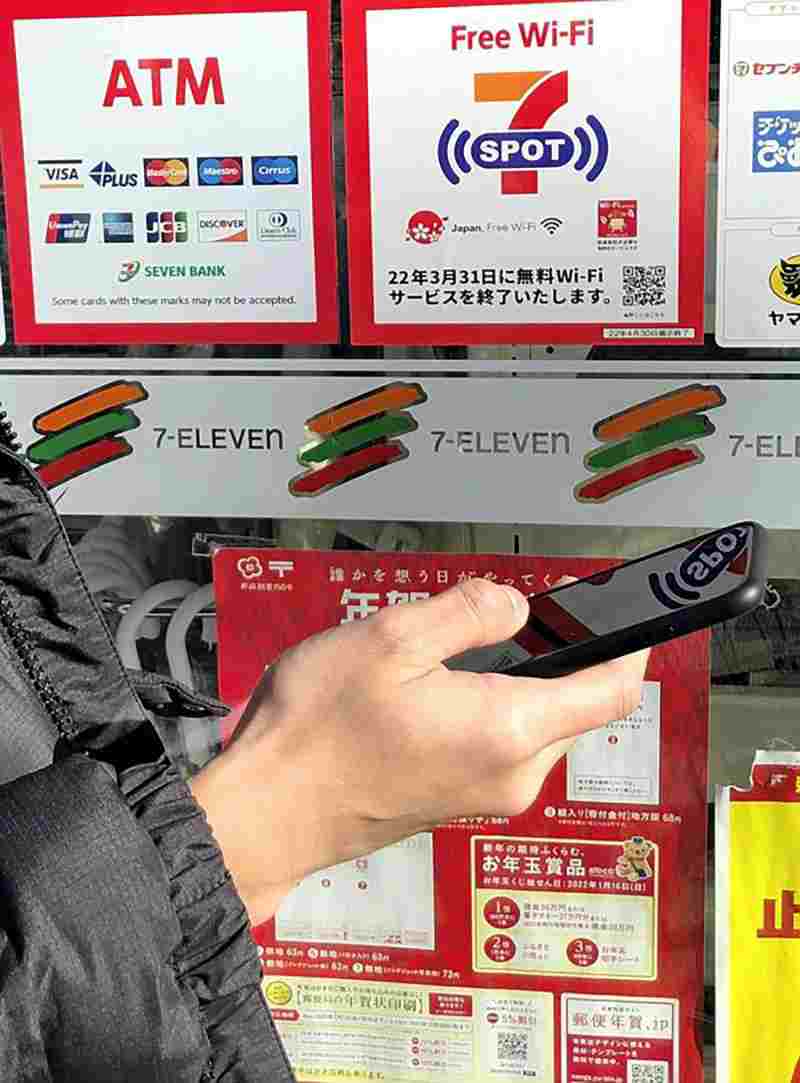
A man recalls the days when he went from one convenience store to another looking for free Wi-Fi, at a convenience store in Adachi Ward, Tokyo, on Jan. 8.
11:16 JST, January 31, 2022
Having a smartphone and access to Wi-Fi has become an indispensable part of finding a job and a place to live. Various groups and organizations are working to provide these vital tools to people in need, backed by the Health, Labor and Welfare Ministry and local governments.
No way out
“Without a phone number, I couldn’t get a job or rent an apartment. There was no way of escaping my situation,” said a 25-year-old man who lives in Adachi Ward, Tokyo, recalling the days when he slept at an internet cafe last summer.
He used to live with his mother at her house, but his income dropped amid the spread of the novel coronavirus and he left that home around July last year, feeling unable to stay. The man had only about ¥20,000, and the smartphone he was using was under his mother’s name. Eventually, the phone was suspended and could no longer serve as his “contact number.”
Moving among convenience stores and other locations with free access to Wi-Fi, the man tried to find a job that came with dormitory accommodations. Without any contact number, however, he had a hard time being hired.
A support group helped him find an apartment during this time, when he was struggling to make enough to eat every day. It also introduced him to Restart, an organization based in Toshima Ward, Tokyo, that rents out smartphones. He at last got a phone number, and managed to find a job at a moving company.
He later became unemployed again, after getting caught up in trouble at his workplace. However, the man said, “I have a smartphone, so I’ll be able to make a comeback again.”
Using special app
Since 2019, Restart has rented out smartphones to an estimated 5,700 people who were introduced to the service by local governments or support organizations. Users must pay a monthly rental fee of ¥ 4,980 and can make as many phone calls as they like, but they cannot use any services that charge additional fees.
“We’re renting out two to three times as many smartphones as before the COVID-19 period,” said Tsubasa Takahashi, 36, the managing director of Restart.
The labor ministry is supplying information on business operators that rent out smartphones to people in need, via social welfare councils and public employment security offices, better known as “Hello Work,” across the country.
Restart is currently one of only two such businesses, but the ministry is aiming to increase the number. A senior official of the ministry said, “We live in an age in which a smartphone is indispensable for people to maintain their lives, so we consider this [the rental of smartphones] to be one of our support measures.”
The social welfare council of Setagaya Ward, Tokyo, in cooperation with Restart, shoulders the ¥4,980 rental fee for three months for people who are in dire straits and strongly want to become self-supporting. So far, 15 people have made use of the help, most of whom are said to have secured places to work and to live. The council is considering increasing the related budget.
Tsukuroi Tokyo Fund, based in Nakano Ward, Tokyo, lends smartphones to the needy for free using a special app through which a user can receive unlimited phone calls and messages, but can make phone calls or send messages only to a few specific recipients.
The organization started this service in July 2020, as it discovered that many of the people seeking its advice had had their smartphones suspended. So far, Tsukuroi Tokyo Fund has lent out about 250 smartphones, it said.
Free Wi-Fi
Efforts are also underway to help people access the internet.
Moyai Support Centre for Independent Living, a non-profit organization based in Shinjuku Ward, Tokyo, offers Wi-Fi and rents smartphone battery chargers for free at the site where it distributes food every Saturday.
According to Moyai, many people sought help when restaurants were forced to operate for shorter hours amid the COVID-19 pandemic, saying they were struggling to recharge their smartphones or access Wi-Fi.
“The internet has become an important lifeline not only in finding a job, but also to get information on the infection situation and relevant [government] measures,” said Ren Ohnishi, managing director of Moyai. “People have limited access to Wi-Fi amid the COVID-19 pandemic, so they need more help to become independent.
Top Articles in Society
-

Man Infected with Measles Reportedly Dined at Restaurant in Tokyo Station
-

Man Infected with Measles May Have Come in Contact with Many People in Tokyo, Went to Store, Restaurant Around When Symptoms Emerged
-

Woman with Measles Visited Hospital in Tokyo Multiple Times Before Being Diagnosed with Disease
-

Australian Woman Dies After Mishap on Ski Lift in Nagano Prefecture
-

Foreign Snowboarder in Serious Condition After Hanging in Midair from Chairlift in Nagano Prefecture
JN ACCESS RANKING
-

Japan PM Takaichi’s Cabinet Resigns en Masse
-

Japan Institute to Use Domestic Commercial Optical Lattice Clock to Set Japan Standard Time
-

Israeli Ambassador to Japan Speaks about Japan’s Role in the Reconstruction of Gaza
-

Man Infected with Measles Reportedly Dined at Restaurant in Tokyo Station
-

Videos Plagiarized, Reposted with False Subtitles Claiming ‘Ryukyu Belongs to China’; Anti-China False Information Also Posted in Japan




















